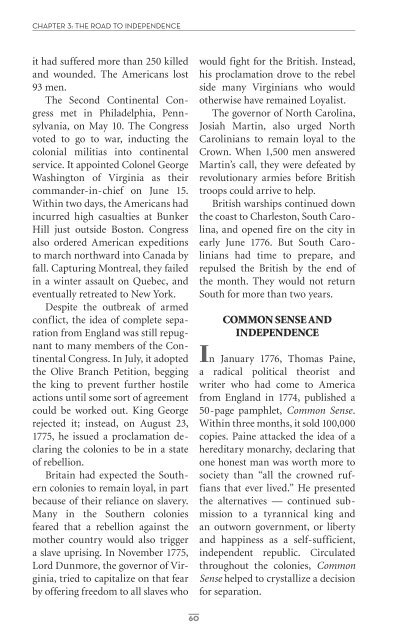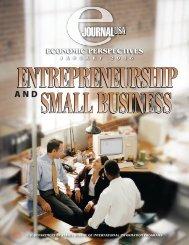s. history us history us history - Embassy of the United States
s. history us history us history - Embassy of the United States
s. history us history us history - Embassy of the United States
- No tags were found...
You also want an ePaper? Increase the reach of your titles
YUMPU automatically turns print PDFs into web optimized ePapers that Google loves.
CHAPTER 3: THE ROAD TO INDEPENDENCEOUTLINE OF U.S. HISTORYit had suffered more than 250 killedand wounded. The Americans lost93 men.The Second Continental Congressmet in Philadelphia, Pennsylvania,on May 10. The Congressvoted to go to war, inducting <strong>the</strong>colonial militias into continentalservice. It appointed Colonel GeorgeWashington <strong>of</strong> Virginia as <strong>the</strong>ircommander-in-chief on June 15.Within two days, <strong>the</strong> Americans hadincurred high casualties at BunkerHill j<strong>us</strong>t outside Boston. Congressalso ordered American expeditionsto march northward into Canada byfall. Capturing Montreal, <strong>the</strong>y failedin a winter assault on Quebec, andeventually retreated to New York.Despite <strong>the</strong> outbreak <strong>of</strong> armedconflict, <strong>the</strong> idea <strong>of</strong> complete separationfrom England was still repugnantto many members <strong>of</strong> <strong>the</strong> ContinentalCongress. In July, it adopted<strong>the</strong> Olive Branch Petition, begging<strong>the</strong> king to prevent fur<strong>the</strong>r hostileactions until some sort <strong>of</strong> agreementcould be worked out. King Georgerejected it; instead, on Aug<strong>us</strong>t 23,1775, he issued a proclamation declaring<strong>the</strong> colonies to be in a state<strong>of</strong> rebellion.Britain had expected <strong>the</strong> Sou<strong>the</strong>rncolonies to remain loyal, in partbeca<strong>us</strong>e <strong>of</strong> <strong>the</strong>ir reliance on slavery.Many in <strong>the</strong> Sou<strong>the</strong>rn coloniesfeared that a rebellion against <strong>the</strong>mo<strong>the</strong>r country would also triggera slave uprising. In November 1775,Lord Dunmore, <strong>the</strong> governor <strong>of</strong> Virginia,tried to capitalize on that fearby <strong>of</strong>fering freedom to all slaves whowould fight for <strong>the</strong> British. Instead,his proclamation drove to <strong>the</strong> rebelside many Virginians who wouldo<strong>the</strong>rwise have remained Loyalist.The governor <strong>of</strong> North Carolina,Josiah Martin, also urged NorthCarolinians to remain loyal to <strong>the</strong>Crown. When 1,500 men answeredMartin’s call, <strong>the</strong>y were defeated byrevolutionary armies before Britishtroops could arrive to help.British warships continued down<strong>the</strong> coast to Charleston, South Carolina,and opened fire on <strong>the</strong> city inearly June 1776. But South Carolinianshad time to prepare, andrepulsed <strong>the</strong> British by <strong>the</strong> end <strong>of</strong><strong>the</strong> month. They would not returnSouth for more than two years.COMMON SENSE ANDINDEPENDENCEIn January 1776, Thomas Paine,a radical political <strong>the</strong>orist andwriter who had come to Americafrom England in 1774, published a50-page pamphlet, Common Sense.Within three months, it sold 100,000copies. Paine attacked <strong>the</strong> idea <strong>of</strong> ahereditary monarchy, declaring thatone honest man was worth more tosociety than “all <strong>the</strong> crowned ruffiansthat ever lived.” He presented<strong>the</strong> alternatives — continued submissionto a tyrannical king andan outworn government, or libertyand happiness as a self-sufficient,independent republic. Circulatedthroughout <strong>the</strong> colonies, CommonSense helped to crystallize a decisionfor separation.There still remained <strong>the</strong> task,however, <strong>of</strong> gaining each colony’sapproval <strong>of</strong> a formal declaration. OnJune 7, Richard Henry Lee <strong>of</strong> Virginiaintroduced a resolution in <strong>the</strong>Second Continental Congress, declaring,“That <strong>the</strong>se <strong>United</strong> Coloniesare, and <strong>of</strong> right ought to be, freeand independent states. ...” Immediately,a committee <strong>of</strong> five, headedby Thomas Jefferson <strong>of</strong> Virginia,was appointed to draft a documentfor a vote.Largely Jefferson’s work, <strong>the</strong> Declaration<strong>of</strong> Independence, adoptedJuly 4, 1776, not only announced<strong>the</strong> birth <strong>of</strong> a new nation, but alsoset forth a philosophy <strong>of</strong> humanfreedom that would become a dynamicforce throughout <strong>the</strong> entireworld. The Declaration drew uponFrench and English Enlightenmentpolitical philosophy, but one influencein particular stands out: JohnLocke’s Second Treatise on Government.Locke took conceptions <strong>of</strong> <strong>the</strong>traditional rights <strong>of</strong> Englishmen anduniversalized <strong>the</strong>m into <strong>the</strong> naturalrights <strong>of</strong> all humankind. TheDeclaration’s familiar opening passageechoes Locke’s social-contract<strong>the</strong>ory <strong>of</strong> government:We hold <strong>the</strong>se truths to be selfevident,that all men are createdequal, that <strong>the</strong>y are endowedby <strong>the</strong>ir Creator with certainunalienable Rights, that among<strong>the</strong>se are Life, Liberty and <strong>the</strong>pursuit <strong>of</strong> Happiness. — That tosecure <strong>the</strong>se rights, Governmentsare instituted among Men,deriving <strong>the</strong>ir j<strong>us</strong>t powers from<strong>the</strong> consent <strong>of</strong> <strong>the</strong> governed,— That whenever any Form <strong>of</strong>Government becomes destructive<strong>of</strong> <strong>the</strong>se ends, it is <strong>the</strong> Right <strong>of</strong> <strong>the</strong>People to alter or to abolish it,and to institute new Government,laying its foundation on suchprinciples and organizing itspowers in such form, as to <strong>the</strong>mshall seem most likely to effect <strong>the</strong>irSafety and Happiness.Jefferson linked Locke’s principlesdirectly to <strong>the</strong> situation in <strong>the</strong> colonies.To fight for American independencewas to fight for a governmentbased on popular consent in place<strong>of</strong> a government by a king who had“combined with o<strong>the</strong>rs to subject<strong>us</strong> to a jurisdiction foreign to ourconstitution, and unacknowledgedby our laws. ...” Only a governmentbased on popular consent could securenatural rights to life, liberty,and <strong>the</strong> pursuit <strong>of</strong> happiness. Th<strong>us</strong>,to fight for American independencewas to fight on behalf <strong>of</strong> one’s ownnatural rights.DEFEATS AND VICTORIESAlthough <strong>the</strong> Americans sufferedsevere setbacks for months afterindependence was declared, <strong>the</strong>irtenacity and perseverance eventuallypaid <strong>of</strong>f. During Aug<strong>us</strong>t 1776,in <strong>the</strong> Battle <strong>of</strong> Long Island in NewYork, Washington’s position becameuntenable, and he executed amasterly retreat in small boats fromBrooklyn to <strong>the</strong> Manhattan shore.British General William Howe twicehesitated and allowed <strong>the</strong> Americans6061












